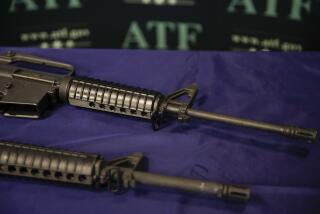Makers of 3-Wheel ATVs Agree to Warn of Risks, Train Riders
- Share via
WASHINGTON — A new settlement calling for more than $8 million in corrective advertising and a continued ban on sales of three-wheel all-terrain vehicles was disclosed Monday by the Consumer Product Safety Commission.
The commission and the Justice Department reached the settlement with five manufacturers of the off-road motor vehicles, which have been involved in more than 900 deaths and about 300,000 injuries in recent years.
U.S. District Judge Gerhard A. Gesell set an April 18 hearing on the settlement, and could declare it effective immediately afterward. It would replace a preliminary agreement between the government and manufacturers announced Dec. 30.
More than 2 million of the small ATVs, which are equipped with balloon tires designed for unpaved surfaces, are reportedly in use.
5 Manufacturers Involved
James V. Lacy, the commission’s general counsel, said that the settlement with government officials involves five manufacturers: Honda, Suzuki, Yamaha, Kawasaki and Polaris Industries.
A ban on sales of new ATVs remains in effect, Lacy said, and the manufacturers have agreed to buy back three-wheel models remaining in dealer inventories.
Four-wheel ATVs, which are more stable, will still be sold, he said, but the marketing of full-size versions with engines of 90 cubic centimeters and larger will be limited to riders who are at least 16 years old.
The December agreement had drawn criticism from Congress and consumer groups as not extensive enough, and some groups campaigned to have all ATVs recalled as unsafe.
Warning Ads Required
Lacy said that under the new settlement, the manufacturers must spend between $8.4 million and $8.6 million on informational advertising, starting in the fall.
The ads will stress the risks inherent in riding the vehicles, Lacy said.
In addition, the manufacturers have agreed to set up a national headquarters for development of safety programs for ATV riders, and to offer training to all who have bought the machines since Dec. 30, 1986.
The owners will be offered incentives such as $50 in cash, a $100 savings bond or merchandise certificates to induce them to take the training, Lacy said.
More to Read
Inside the business of entertainment
The Wide Shot brings you news, analysis and insights on everything from streaming wars to production — and what it all means for the future.
You may occasionally receive promotional content from the Los Angeles Times.









